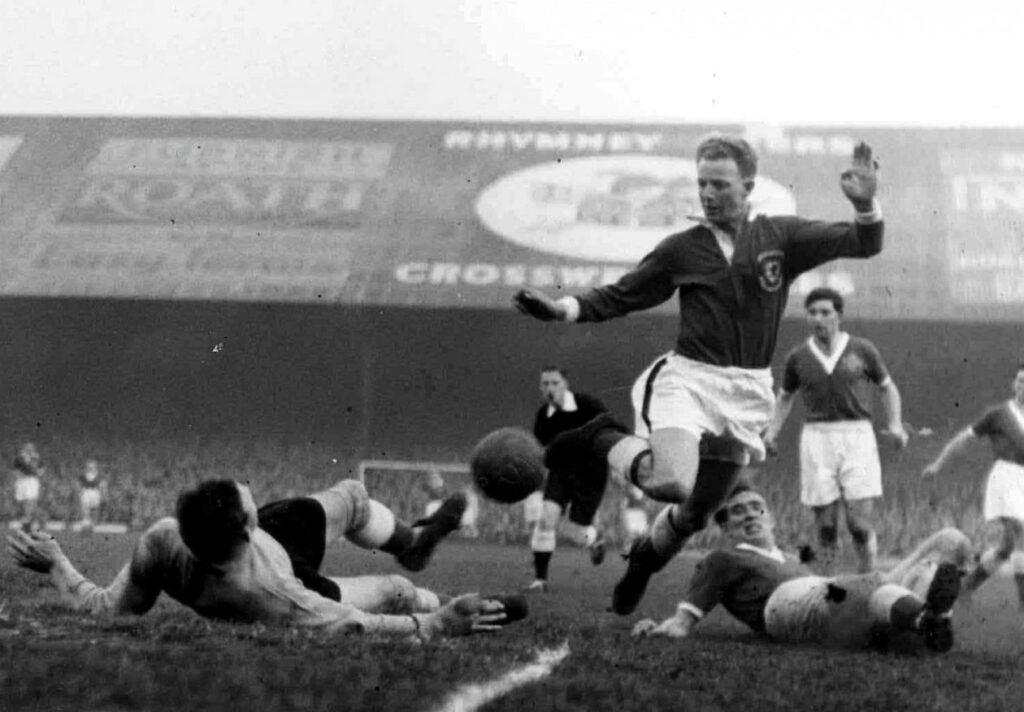
IVOR ALLCHURCH was a Welsh professional footballer who played for Swansea Town, Newcastle United and Cardiff City, as well as the Wales national football team.
Allchurch enjoyed a long and distinguished career. As a skilful inside-forward he thrilled crowds with his wide range of passing, a hypnotic body swerve and deadly shooting.
Joining Swansea Town in 1947, he went on to play until 1968 with Newcastle United and Cardiff City before re-joining Swansea. In 691 league games he scored 249 goals, including 17 hat-tricks. In 1966, he received an MBE for services to football.
For Wales, he was a key part of a golden generation who went to the World Cup finals in 1958. He scored 23 goals in 68 games and his number of caps was a record until 1986, when surpassed by Joey Jones. He jointly held the record number of goals scored for Wales, along with Trevor Ford, 23, eventually broken by Ian Rush.
His talents were more widely recognised after his performance for Wales during the 1958 World Cup, in which he scored twice and helped them to reach the quarter-finals. His brother Len was also a footballer and the pair played alongside each other for Wales on several occasions.
Although retiring from league football at the age of 38, Allchurch continued playing in non-league and local football until his 50th year. A statue of the ‘Golden Boy of Welsh football’ now stands outside Swansea City’s Liberty Stadium, following his passing on Juky 10, 1997.
Allchurch played as an inside forward, and began his career playing for his home-town side Swansea Town where he spent over 10 years, captaining the team for several seasons and scoring over 100 goals in all competitions.
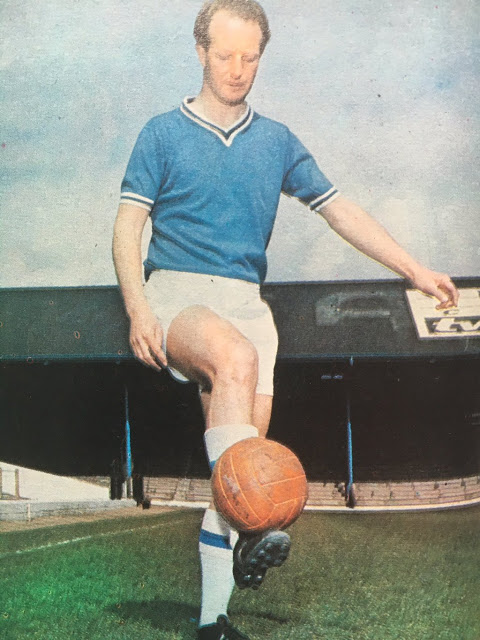
He attracted attention from numerous clubs during his early years with Swansea but chose to remain with the club until the age of 28 when he joined First Division side Newcastle United. Signing in 1958 for a fee of £28,000, he formed a prolific strike partnership with George Eastham and Len White.
In 1962, he joined Cardiff City for £18,000, spending three seasons at Ninian Park before finishing his professional career with a second spell at Swansea, where he became the club’s all-time top goalscorer.
As a child, he attended Plasmarl School, leaving at the age of 14 to find employment. He worked in an office at Baldwin’s Foundry, a company that manufactured bomb casings, but later took up work as a porter in a local fish market.
Allchurch was playing local youth football when he was spotted a Swansea Town scout.
In 1948, when he turned 18, Allchurch was called up to start his National Service and enlisted as a gunner in the British Army. Stationed in Oswestry, he continued to play football for the representative sides of his unit and Western Command.
He returned to Swansea in 1949, where manager Billy McCandless had already received offers for Allchurch even though he had not made his professional debut. He received his first call-up to the first team on Boxing Day 1949 at the age of 20, making his debut in a 3–0 defeat to West Ham United.
Allchurch scored his first senior goal for the club in a 3–0 victory over First Division side Birmingham City in the third round of the FA Cup and went on to claim a Welsh Cup winners’ medal at the end of the 1949–50 season, playing in a 4–1 victory over Wrexham in the final on April 27, 1950.
Allchurch becoming the youngest player in the club’s history to be ever-present during an entire season, having played in every league game for the club, during the 1950–51 season. Further approaches from Liverpool, Wolverhampton Wanderers and Manchester City were also rejected by the Swans.
In September 1952, Swansea rejected a bid of £30,000 from Arsenal for Allchurch, the bid just £5,000 below the British record transfer fee at the time.
Allchurch’s eventual decision to leave the Swans saw a large amount of interest, with Liverpool offering to fly a private plane to south Wales and meet any valuation Swansea placed on him. Aston Villa had an offer accepted, but Newcastle United chairman Alderman McKeag quickly offered an increased amount of £28,000. Allchurch travelled to Manchester to meet Newcastle manager Charlie Mitten where he was convinced to join Newcastle, signing his contract on a luggage trolley at Manchester Exchange railway station.
Despite having never met his new team-mates, he made his debut for the club, his first match in the First Division, the following day against Leicester City, scoring twice during a 3–1 victory.
With Newcastle struggling during the 1959-60 campaign, the board denied Allchurch permission to be released to play a fixture for Wales in order to focus on the club’s fortunes, which saw an aggrieved Allchurch hand in a transfer request as he believed the club had “broken their word” after a verbal agreement that he would be released for any international fixtures.
Newcastle were able to return to form and his transfer request was eventually dropped as the Magpies finished the season in eighth position, Allchurch reaching double figure league goals during the season for the second consecutive year in the First Division.
The following season Allchurch submitted another rejected transfer request, this time due to his wish to return to south Wales in order for his wife Esme to be near her family during pregnancy. Allchurch withdrew his transfer request and, later in the season, following an injury to captain Jimmy Scoular, was elected as the stand-in captain by the squad. However, Newcastle suffered relegation to the Second Division in May 1961.
Allchurch was made permanent team captain for the start of the following season, and the abolition of the maximum wage cap saw Allchurch’s wages rise to £60 per week. He later resigned as captain after the Newcastle board again attempted to block a call-up to the Welsh national side. The death of a prematurely-born daughter affected Allchurch’s form as he looked after his children during his wife’s recovery and the personal difficulty during this period convinced Allchurch to announce his intention to leave the club and move closer to his wider family.
In August 1962, he joined Cardiff City, who had been relegated from the First Division the previous season, for a fee of £18,000. The club board had drawn criticism from fans for signing older Welsh players who were seen as faded stars, such as Trevor Ford and Mel Charles, in previous seasons but pushed forward to complete the signing of then 32-year old Allchurch.
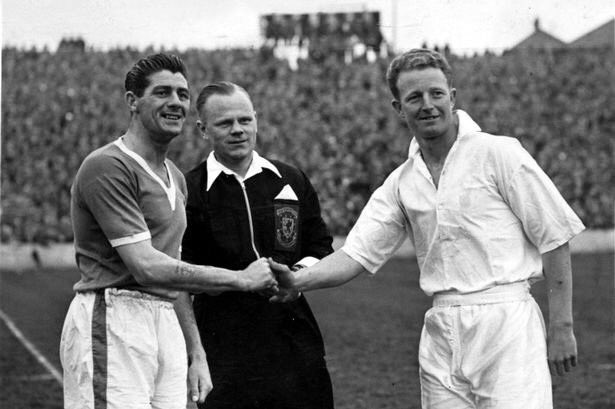
Taking a £20-per-week pay cut to join the Bluebirds, Allchurch made his debut on the opening day of the 1962–63 season, captaining the side and scoring in a 4-4 draw with his former club Newcastle United.
In the following weeks, local newspapers attributed the club’s positive start to the season to Allchurch’s leadership with the South Wales Echo claiming that he was “one of the best skippers the club has ever had”. But despite this and a prolific forward partnership formed between Allchurch and Peter Hooper, who scored 34 league goals between them, the club eventually faded into a mid-table place, finishing in 10th position.
Prior to the start of the 1963–64 season, the club saw the departures of several key players, including Hooper and Alan Durban. The signing of fellow Welsh international John Charles had raised hopes of improvement but the side struggled throughout the season, winning just 14 league matches out of 42. Allchurch finished as the club’s top league scorer, scoring 12 times including a hat-trick against Sunderland in September 1963.
Don Murray, a young centre-half, commented that he regarded it as a privilege to play alongside Allchurch and Charles and stated: “There was a saying among the players, if you are in trouble give it to Ivor”.
He scored nine times following his return to the first team, including a hat-trick against his former side Swansea which condemned them to relegation into the Third Division, to finish as the club’s top goalscorer for the second consecutive season.
He also made his debut in European competition, as Cardiff qualified for the European Cup Winners’ Cup, having won the Welsh Cup the previous year, playing in a 0–0 draw with Danish side Esbjerg fB in the first round. He played his final match for the club on April 24, 1965, scoring Cardiff’s first goal during a 3–1 victory over Rotherham United.
At the age of 35, Allchurch returned to home-town club Swansea, after they agreed a fee of £8,000 with Cardiff to complete the transfer. His return to Vetch Field saw a significant increase in the sale of season tickets and Allchurch was greeted by a large “welcome home Ivor” banner in his first game on his return.
In the 1966 New Year’s Honours list, Allchurch was awarded an MBE for his services to sport. The club finished the season in the bottom half of the table, but did win the Welsh Cup, defeating Chester City in the final with Allchurch scoring the winning goal.
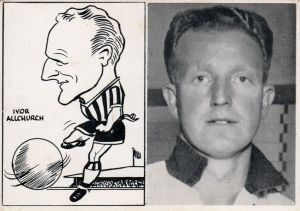
Swansea suffered relegation to the Fourth Division at the end of the 1966–67 season. Allchurch was switched to playing as a striker by manager Billy Lucas in order to lessen the amount of running required of a player who had turned 38 during the opening months of the season. The change of position benefited him, scoring 17 times in the league in 40 matches.
He made his final appearance on May 6, 1968, against Hartlepool, retiring from professional football as Swansea’s all-time record goalscorer. He later spent time playing non-league football with Worcester City and had a spell as player-manager of Haverfordwest County before ending his career at Pontardawe Athletic at the age of 50.
Allchurch was called up to the Wales senior squad for the first time at the age of 21, having made just 30 senior league appearances for Swansea, making his international debut in a 4–2 defeat to England on November 15, 1950, at Roker Park in the 1950–51 British Home Championship.
He would remain a regular fixture in the Wales side, making a further 26 consecutive appearances for his country after his debut over the following six years, and was part of the squad that qualified for the 1958 FIFA World Cup by defeating Israel in a play-off match, scoring in both legs of the tie.
He was chosen in the squad for the finals in Sweden and scored seven times in a 19–0 victory over a local amateur side during a warm-up match. He played in all three of Wales’s group matches, scoring in a 1–1 draw with Mexico, and netted their first goal in a 2–1 victory over Hungary in a play-off match to reach the quarter-finals.
They lost 1–0 to eventual winners Brazil in the quarter-finals following a goal from Pelé. Following the tournament, Wales international Dave Bowen commented that they had “surprised a lot of people” with their performance and also praised Allchurch, stating: “they looked at Ivor and wondered where he had been hiding. He could have played for any of the teams out there, including Brazil”.
In 1962, he won his 50th international cap in a match against Scotland, becoming Wales’s most capped player of all-time. He played his final game for his country against Chile in 1966.
Allchurch was named BBC Wales Sports Personality of the Year in 1962. He later became a member of the Welsh Sports Hall of Fame and the English Football Hall of Fame, having been inducted in 1995 and 2005 respectively.
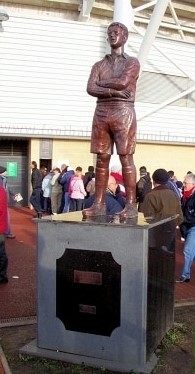
Allchurch and his wife moved to a bungalow in Bishopston, Swansea after his retirement from professional football and he worked as a storeman for a stationery company. He died on July 10, 1997, at his home aged 67. His funeral was held at Swansea Crematorium and attracted over 500 people.
To celebrate Allchurch’s achievements for his local club, it was originally decided that money should be raised for a bust of him, which was raised by Swansea City supporters. However, the strong support eventually saw the plans changed to incorporate a statute outside their stadium. In 2005, a life-sized statue of Allchurch was unveiled outside Swansea’s newly-opened Liberty Stadium.
Manchester United manager Sir Matt Busby said of Allchurch: “he never needed a number on his back for identification. His polish, his class could not be missed. He vies with the greatest of all time, yet he has a modesty that becomes him.”
BACK TO HOME PAGE
